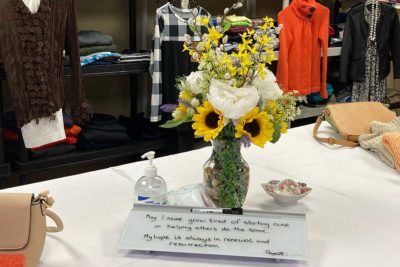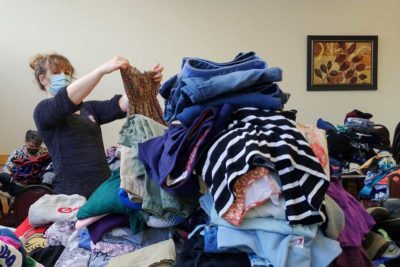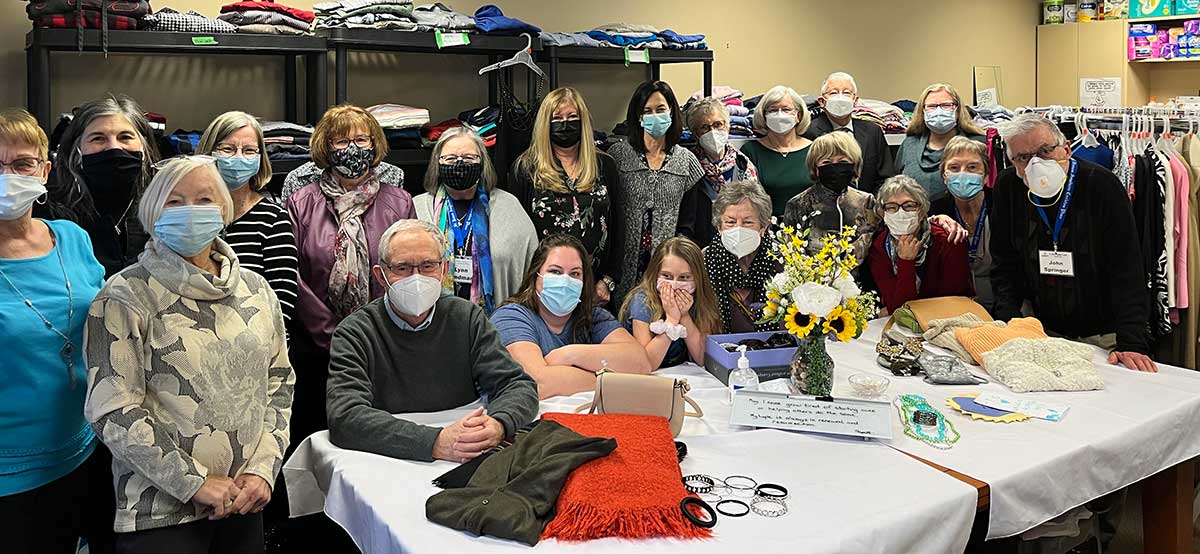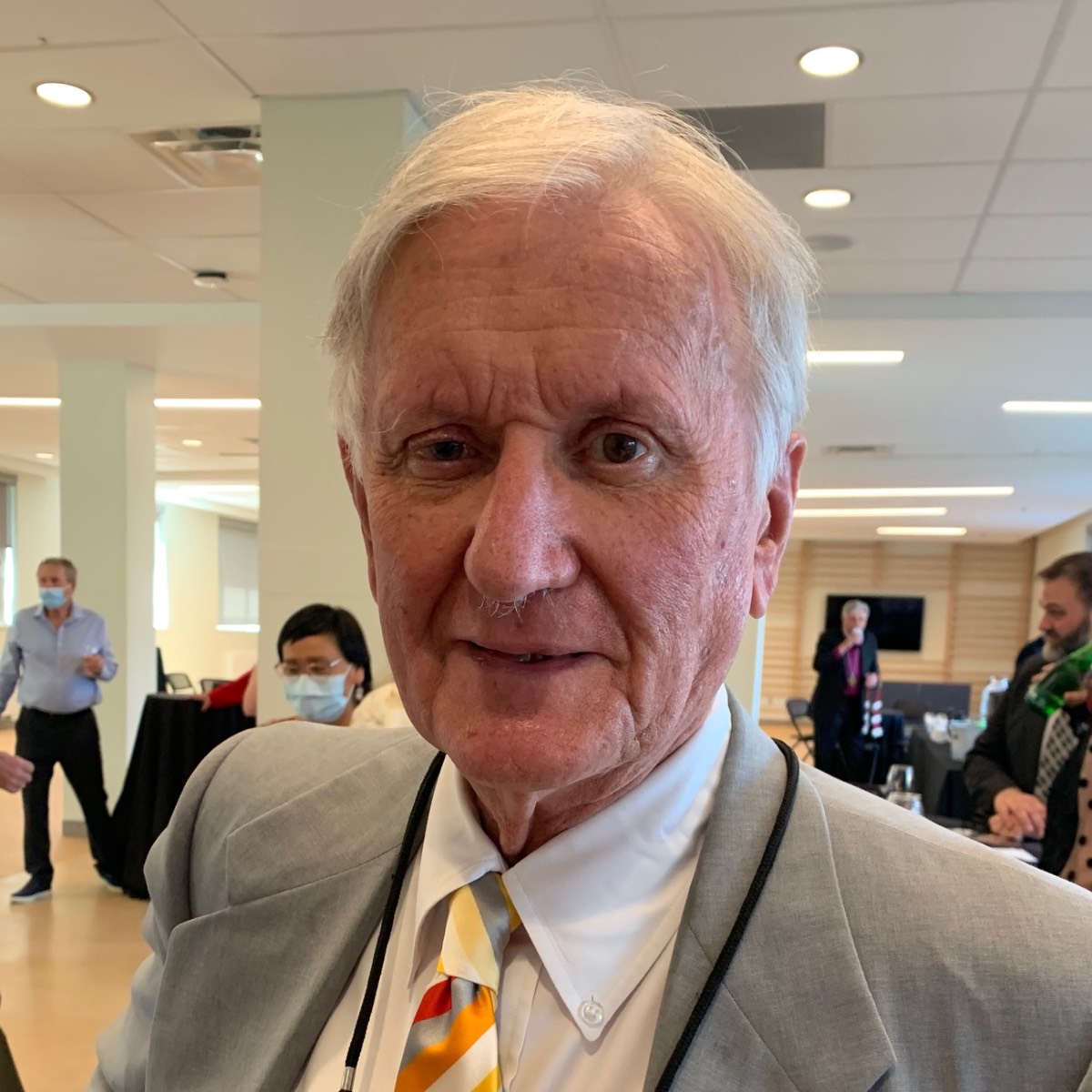St. James Church in Carleton Place is a distribution centre and key community supporter for a grassroots initiative that is bringing Ukrainians fleeing the war to Canada.
The initiative arose out of a daughter’s concern for her mother and siblings who had fled to Poland. Mary Mokrushyna and her partner Zack Nethery began by asking around for help to bring them to Canada. Donations of cash, clothing and supplies for everyday living began pouring into their Carleton Place home from as far away as Manotick.
They were soon overwhelmed and running out of storage space. Carleton Place town councillor and St James parishioner Linda Seccaspina suggested to Archdeacon Brian Kauk, Incumbent at St James, that the church could help.
 He opened the church hall and other rooms for storage. They soon filled up with supplies such as clothing, toys, baby supplies and toiletries. The church’s website was adapted to handle donations. It is regularly updated on current needs.
He opened the church hall and other rooms for storage. They soon filled up with supplies such as clothing, toys, baby supplies and toiletries. The church’s website was adapted to handle donations. It is regularly updated on current needs.
Members of the congregation stepped up as goods continued to arrive. Peter Hicks took charge of donations. Brenda Adam handled supplies as the stores manager. Parish administrator Catherine Pretty reprogrammed the phone system for extra lines and found herself graciously greeting people who showed up with offers of help.
Within a week they created the St James Boutique that “has almost everything our new friends will need.”
“St James has been a massive player for us,” Zack Nethery says. “They have been irreplaceable and invaluable.”
Archdeacon Kauk says there is satisfaction in being able to provide people with the dignity of choosing what they need after the indignity of fleeing their homeland.
“When we are open to God’s Holy Spirit working in us, in partnership with the wider community amazing things can happen,” he says.
The partnership includes strong ecumenical support. The pastors of four town churches—St James, Zion-Memorial United, Carleton Place Baptist and Ottawa Valley Community—were already active in discussions about affordable housing.
They got together with members of their congregations to post a video on YouTube asking for support for arriving Ukrainian families.
Zion-Memorial did a special collection and hosted a fundraising event with artist Janet Beath. She also donated partial proceeds from the sale of painted silk scarves.
Neighbouring St Paul’s Anglican Almonte lent their rolling racks to help St James for the storage of clothing.
The community support encouraged Mokrushyna and Nethery to double down and expand their own efforts.
By early April they had set up a non-profit organization as a federally registered charity, Ukrainian Diaspora Support Canada (UDSC).
Their website (www.uadsc.org) recorded 140 Ukrainian families – representing hundreds of individuals who had completed applications and were awaiting funding for air fares.
On the receiving end, 160 Ottawa Valley families had registered their willingness to billet families that continued to arrive throughout April.
Ironically, Mokrushyna’s mother Olga Ialovenko, sister Alice and brother Petro were still sheltering with friends in Warsaw, awaiting approval. They had applied manually before the government opened a more streamlined digital process.
Mokrushyna and Nethery are providing full service support. They have a network of contacts in Ukraine to identify people with an interest in coming to Canada. “They direct them to us and we do everything else,” says Nethery.

Everything else includes getting all necessary documents in order, completing the application process and raising the airfare. That’s where the Canadian end of the service begins.
Most who want to come to Canada can’t afford the airfare. The total number who arrive will largely depend on the UDSC fundraising efforts augmented by those of St James and the other churches.
Once here there is no shortage of help. Doctors and lawyers are on a “full list” of expert volunteers who are offering their services pro bono to the newcomers.
Nethery says there are no borders. If some arrivals want to locate elsewhere in Canada they will be helped to move.
Contrary to some popular views, Mokrushyna and Nethery believe most arrivals will want to stay and start a new life in Canada, just as she did when she came to study here four years ago.


Saint Mary’s Church, Westmeath — Deanery of the Northwest